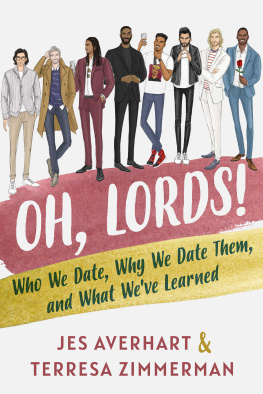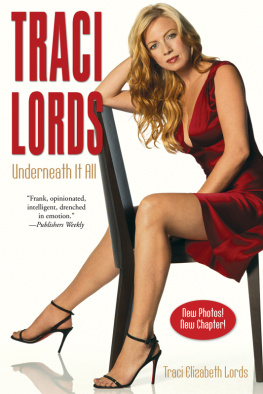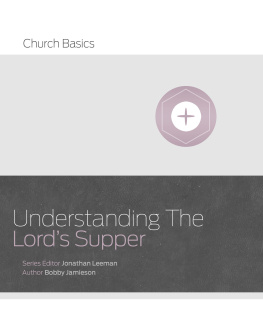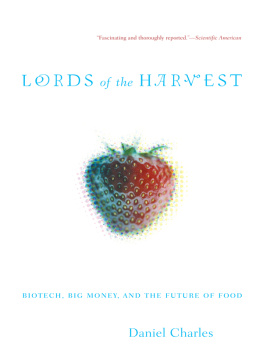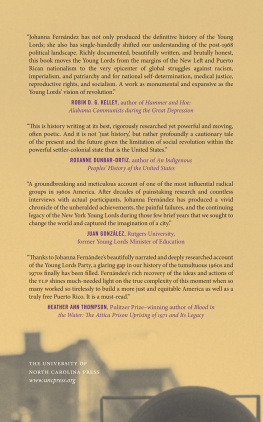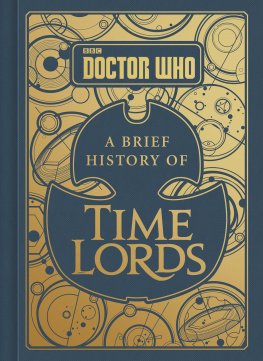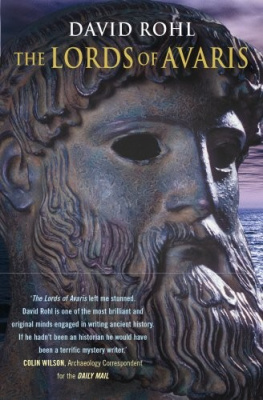Thank you for buying this ebook, published by NYU Press.
Sign up for our e-newsletters to receive information about forthcoming books, special discounts, and more!
Sign Up!
About NYU Press
A publisher of original scholarship since its founding in 1916, New York University Press Produces more than 100 new books each year, with a backlist of 3,000 titles in print. Working across the humanities and social sciences, NYU Press has award-winning lists in sociology, law, cultural and American studies, religion, American history, anthropology, politics, criminology, media and communication, literary studies, and psychology.
The Young Lords
The Young Lords
A READER
Edited byDarrel Enck-Wanzer
FOREWORD BY IRIS MORALES
AND DENISE OLIVER-VELEZ

NEW YORK UNIVERSITY PRESS
New York and London
www.nyupress.org
2010 by New York University
All rights reserved
Library of Congress CataloginginPublication Data
The Young Lords : a reader / edited by Darrel Enck-Wanzer ;
foreword by Iris Morales and Denise Oliver-Velez.
p. cm. Includes bibliographical references and index.
ISBN 9780814722411 (cloth : acid-free paper)
ISBN 9780814722428 (pbk. : acid-free paper)
1. Young Lords (Organization)HistorySources. 2. Puerto Ricans
New York (State)New YorkSocial conditions20th centurySources.
3. Puerto RicansNew York (State)New YorkPolitics and government
20th centurySources. 4. Puerto RicansNew York (State)New York
Biography. 5. Political activistsNew York (State)New YorkBiography.
6. New York (N.Y.)Social conditions20th centurySources. 7. New York
(N.Y.)Ethnic relationsSources. 8. New York (N.Y.)Biography.
9. Readers. I. Enck-Wanzer, Darrel.
F128.9. P85Y68 2010
305.86872950747DC22 2010020183
New York University Press books are printed on acid-free paper, and their
binding materials are chosen for strength and durability. We strive to use
environmentally responsible suppliers and materials to the greatest extent
possible in publishing our books.
Manufactured in the United States of America
C 10 9 8 7 6 5 4 3 2 1
P 10 9 8 7 6 5 4 3 2 1
Contents
IRIS MORALES AND DENISE OLIVER-VELEZ
DARREL ENCK-WANZER
An insert appears following .
Foreword
Why Read the Young Lords Today?
IRIS MORALES AND DENISE OLIVER-VELEZ
El Pueblo Unido, Jamas Sera Vencido! The People United, Shall Never be Defeated! Ten thousand people chanted and marched through the streets of El Barrio heading downtown on Lexington Avenue in New York City. The Young Lords had called the march to the United Nations to demand the end of U.S. colonialism in Puerto Rico, freedom for Puerto Rican political prisoners, and an end to police brutality in our communities. Young people, artists, and community activists joined it, excited to be part of the momentous event. Looking from the hilltop on 100th Street, we saw the bright purple, black, and maroon berets of the Young Lords, the Black Panthers, and the Puerto Rican Student Union. Activists from the Puerto Rican Socialist Party, El Comite, Justicia Latina, and others were also present. Young people wearing jeans and t-shirts, military jackets, dashikis, combat boots, and big Afros carried Puerto Rican flags and huge, almost avenue-wide banners that read, Serve the people and Fight U.S. imperialism. With confidence, we marched, believing deep in our hearts in the power of poor people to change the world. Despierta Boricua, Defiende Lo Tuyo! (Wake Up Boricua, Defend What Is Yours!) It was October 30, 1971.
Some of the issues we faced as political young people back in those early halcyon days of the movements of the 1960s and 70s have changed. We were BC: before crack. There was no AIDS pandemic. Youth gangs didnt have automatic weapons. No one had a computer, a cell phone, or email. There was no Homeland Security or PATRIOT Act. The World Trade Center hadnt been built, much less destroyed. There were no music videos or MTV. Our rap music was spoken word poetry set to the sound of conga drums or do-wops sung on street corners. Oprah Winfrey didnt have a TV show, and J-Lo hadnt been born.
The women and men whom we strove to emulate and live up to had names like Lolita Lebron, Don Pedro Albizu Campos, Sojourner Truth, Malcolm X, Blanca Canales, and Fannie Lou Hamer. The Rainbow Coalition was Fred Hamptons revolutionary vision of unity among poor people, not Jesse Jacksons poverty program.
When we entered the Young Lords in its early days, the leadership was all male. We helped to change that and to create an organization of young women and men struggling together to change the world and ourselves in the process. We connected to a larger movement in our opposition to the war in Vietnam. Inspired by the Cuban and Chinese revolutions and by the liberation struggles in Africa and Latin America, we believed that we could change the U.S. economic, political, and social system. Puerto Rican and African American youth joined the Young Lords, determined to change the status quo.
We awoke early each day to serve breakfast to school children, went door to door testing residents for lead poisoning and anemia, developed ground-breaking programs to deal with drug addiction, conducted community political education classes, and mobilized demonstrations. We advocated for community control of schools and educational curriculums that included Puerto Rican history and culture. We organized hospital and factory workers and worker-community alliances; and from the beginning, health care was a priority. We organized to change prison conditions and defined the prison system as another form of genocide. We raised awareness about the triple oppression of women of color by class, race, and gender. We wanted to change our communities, and perhaps while doing so, change our brothers. We organized high school and college students, and with the Puerto Rican Student Union formed Free Puerto Rico Now committees on college campuses. We published and distributed Palante, a bilingual newspaper, and produced a radio show on WBAI-FM, Pacifica, New York. We inspired, and were inspired by, our artists, poets, and musicians to play to the drumbeat of revolution. We were breaking new ground and lived each day as if there would be no tomorrow, and for some of our comrades and compaeras, the struggle ended in jails, institutions, and the Long Island cemeteries of Pedro Pietris Puerto Rican Obituary.
Latino youth and community activists have tried to keep the Young Lords history alive, identifying with the groups spirit of resistance, its ideas about equality, and its bold and dramatic actions. When Palante, a book of essays and photographs about the Young Lords first published in 1971, went out of print, Latino students reproduced and circulated photocopies, and a bookstore sold a high-quality copy for years. El Pueblo Se Levanta, Newsreels cinma-vrit film produced in 1971, persists as a visual first-hand account. More than two decades later, Puerto Rican young people assisted in the production of Palante, Siempre Palante! The Young Lords, the Latino/a Education Network Service (LENS) documentary that continues to be screened in schools and community venues, connecting the Young Lords with another generation.
School curricula pay lip service to Black history, but Puerto Ricans didnt make the cut. Martin Luther King is an icon on a postage stamp, no longer part of an ongoing mass movement; but the struggle for human and civil rights did not end at his death. The Black Panthers, Young Lords, Brown Berets, I Wor Kuen, American Indian Movement, and the followers of Malcolm were too dangerous to even pay lip service to and have been relegated to the obscurity of a few documentary glimpses in art film showings. In 1996, public television broadcast two documentaries about Puerto Rico and the role of Puerto Ricans in Americas history, both on the Island and in the United States, but since then it has not broadcast anything else.
Next page

